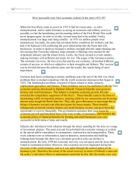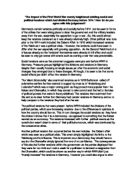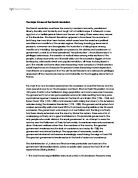How successful were Nazi economic policies in the years 1933-45?
How successful were Nazi economic policies in the years 1933-45? When the Nazi Party came to power in 1933 it had two main aims - to solve unemployment, and to make Germany as strong an economic and military power as possible, so that the humiliating and devastating defeat of the First World War could never happen again. In order to do this, several areas had to be tackled. Firstly, unemployment was huge and rising steadily - in 1933 six million people were unemployed. Secondly, the party had promised better conditions for workers, and this had to be balanced with continuing the good relationship that the Nazis had with businesses. In order to build up Germany's military strength after the under-funding and downsizing that Versailles imposed, large amounts of funding were needed for the armaments industry and the armed forces. Lastly, the Nazis wanted to create autarky - making Germany self-sufficient and ready for war. The stages of the German economy - The economic recovery, the four year plan and the war economy, all reached different extents of success, to which are subjective to their strengths and failures. The 'success' can be divided between the policies aims, and the results, the results being of most importance. Germany had faced continuing economic problems since the end of the first war, those problems then worsened coinciding with the world economic depression
Why did the League of Nations fail?
Why did the League of Nations fail? By Richard Ward [email protected] The objectives of the League of Nations were to 'promote international co-operation and to achieve peace and security'. The League failed these ideals as early as 1921, when Poland occupied Vilna. It failed these objectives once more in 1923 when Mussolini held Greece ransom by occupying and bombing the island of Corfu. Yet the League was not dissolved until 1946. It continued to meet and its agencies continued their work. It was only after 1936 and the collapse of Abyssinian resistance that public opinion swung against the League on a great scale. Until the early 1930s, the League of Nations had been displayed in a favourable light as a success. The failures at Corfu and Vilna had been overshadowed by successes at the Åland Islands and in the Greek-Bulgarian war and the booming world economy. Added to that, improvements in international relations had cast a general aura of wellbeing over the world. In hindsight, it is arguable that the League had failed shortly after it had started, but at that time everyone was shocked at the realisation that the League was not everything it said it was. On October 24th 1929, the US stock market in Wall Street crashed. The value of shares plummeted as the stock market was ordered to 'sell at any price'. Herbert Hoover, US President, had advocated the
The Problems of the Weimar Republic and the Path to War.
Aaron Jordan Andrew Thomas In 1918 towards the end of the Second World War, imperial Germany was ruled by Kaiser Wilhelm II and secretly the High Command. The High Command, under Ludendorff and Hindenburg, sensed the inevitability of defeat and tried to ease their way towards an armistice with the Allies. However not before considering one last ditch stand against the allies. (1) In the events that occurred, the Kaiser abdicated on the 9th of November with massive munity’s occurring all over Germany, mainly at Kiel and Wilhelmshaven with the German naval fleet. Councils had appeared in Berlin and Cologne (2) and down in the south in Munich, Kurt Eisner declared Bavaria as an independent republic. (3) On the 9th of November Fredich Ebert took over from Prince Max of Baden as the Chancellor of Germany. On top of the Reichstag building in Berlin, Philip Scheidemann spoke to the people “The old and rotten – the monarchy – has broken down. Long live the new! Long live the German Republic!” (4) Two days later, on the 11th of November, Germany signed an armistice with the Allies bringing an end to the war. This piece of work will highlight the inauspicious circumstances that the German government was born in during the years of 1918-1923. This essay will highlight the political, economical and the violent problems that the new Republic faced and how some courses of its


















